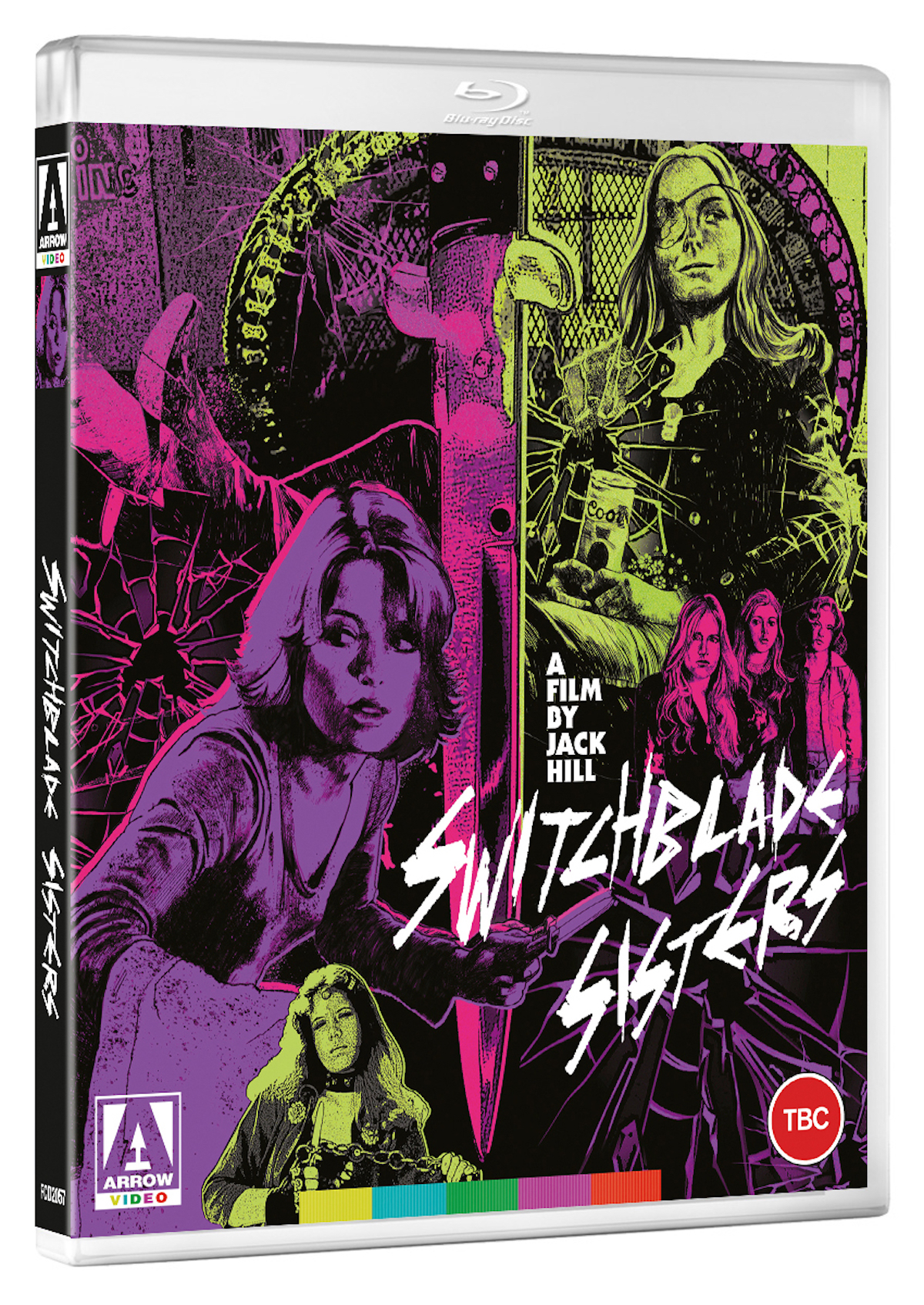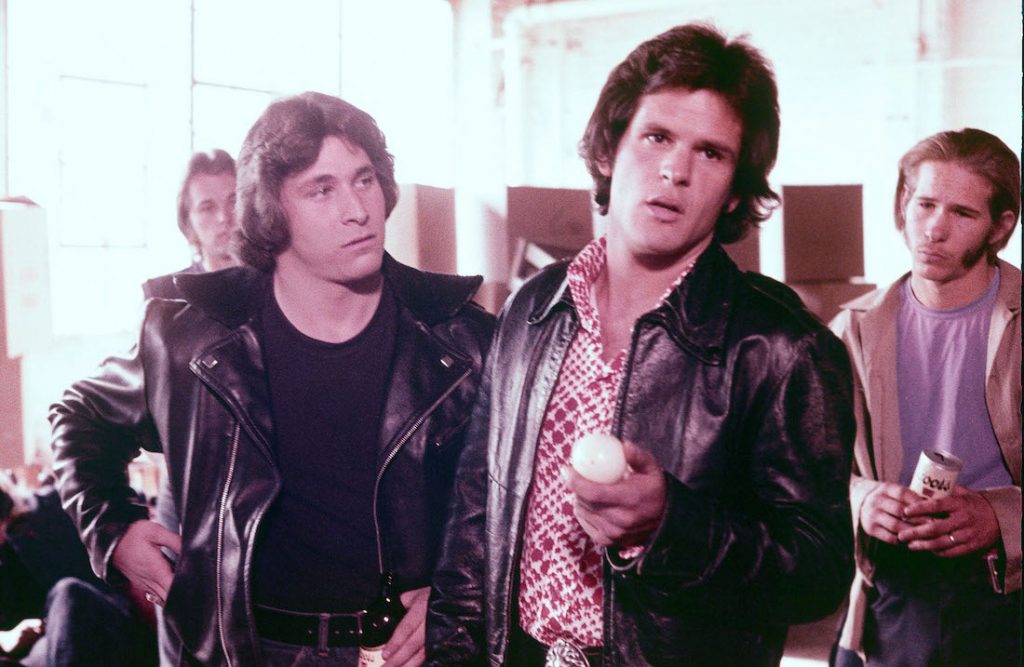SWITCHBLADE SISTERS (1975)
The leader of an inner city girl gang is challenged when a new girl moves into the neighbourhood.

The leader of an inner city girl gang is challenged when a new girl moves into the neighbourhood.


While the pantheon of filmmakers that graduated from Roger Corman’s school went on to mainstream success and critical acclaim, Jack Hill pioneered a genre that stayed in cult film circles. Along with Russ Meyer (Faster, Pussycat! Kill! Kill!) and Herschell Gordon Lewis (She-Devils on Wheels), Hill is regarded as one of the greatest exploitation filmmakers of the 1970s. He’s perhaps best known for changing Hollywood’s attitude towards race with the two defining Pam Grier vehicles, Coffy (1972) and Foxy Brown (1974). He also familiarised the female action heroine with The Big Bird Cage (1972) and The Big Doll House (1971), predating the likes of blockbuster icons Ellen Ripley and Sarah Connor. With an outrageous, pulpy combination of feminism, street gangs, and revenge, Switchblade Sisters may be the exploitation auteur’s crowning achievement.
Switchblade Sisters follows Lace (Robbie Lee), the leader of female gang the Dagger Debs, who are the counterpart to all-male gang the Silver Daggers. The two gangs deliberately look for trouble, thinking nothing of intimidating all those around them with their carefully maintained switchblades. Following an aggressive confrontation in a restaurant, Lace is introduced to the new girl in town, Maggie (Joanne Nail), and as their friendship grows, Maggie eventually joins the Dagger Debs. Challenging the status quo, Maggie quickly becomes a rival to the second in command, Patch (Monica Gayle), and as she becomes a highly valued member of the Dagger Debs they eventually separate themselves from the oppressive and overshadowing Silver Daggers. However, tensions develop between the gangs, leading to Lace and Patch formulating a plot that leads to bloodshed.
Although Switchblade Sisters lacks the powerful and demanding performance of Pam Grier, the young cast are convincing in their roles. Hill’s characters are notable and unique for their complicated, clashing personalities and strong female perspective. One of the more memorable aspects of Hill’s picture is the performance of Robbie Lee (Big Bad Mama) as the leader of the Dagger Debs, Lace. She’s aggressive and violent with a penchant for beating everyone to a pulp. Delivering her dialogue through gritted teeth, evoking Charlton Heston in Planet of the Apes (1968), Lee conveys both a toughness and vulnerability. We’re first introduced to the character as she’s sharpening her switchblade wearing a leather cap and knee-high boots. However, as she’s ridiculed by Dominic (Asher Brauner), Lace slowly loses power over the Dagger Debs until she’s ultimately rejected. Admittedly, she looks too young to be spearheading a violent female gang! However, one can’t help but adore her oddly appealing baby face and colourful personality.
Undoubtedly, Switchblade Sisters is an unapologetic and outrageous slice of grindhouse fun. Writer-director Jack Hill infused his unique exploitation style into this ’70s retelling of Shakespeare’s Othello. Successfully combining elements from Cleopatra Jones (1973) and Caged Heat (1975), Switchblade Sisters is an amalgamation of several exploitation sub-genres. Working with a shoestring budget of $340,000, the director delivers deeply trashy action sequences that are incredibly entertaining. A wonderful shootout during a roller disco is a particular highlight, evoking The Unholy Rollers (1972). Hill’s stylish tracking shots capture the movements of the Dagger Debs skating before attacking the rival gang with metal chains. Whereas the final showdown is simultaneously suspenseful, spirited, and rather touching. As Maggie rebrands the gang as ‘The Jezebels’, they team up with a group of Maoist revolutionaries, spearheaded by Muff (Marlene Clark), which leads to a virulent street battle involving armoured vehicles, machine guns, and Molotov cocktails! Hill’s pictures are never anything more than cheap fun and Switchblade Sisters delivers a concentrated dose of pulpy entertainment.
Aiding Hill’s directorial flourish is F.X Maier’s excellent script, inspired by the mesmerising illustrations of pulp magazines. Producers Frank Moreno (The Imported Bridegroom) and John Prizer (Swinging Cheerleaders) launched the one-sheet poster for Switchblade Sisters before a story had even been developed. Originally titled The Jezebels, Maier and Hill co-write the screenplay paralleling the imagery. Like most of its genre brethren, Switchblade Sisters delivers what the artwork promises. It’s essentially a 1950s teenage delinquency story wrapped in a grindhouse aesthetic, filled with gratuitous nudity and unrealistic violence. While the often hilarious dialogue (“Freeze, greaseball!”) highlights the funnier moments, Hill and Maier successfully craft some realistic characters. Surprisingly, the majority of the characters are complex and deal with real-life issues, including teen pregnancy and rape. Lace and Maggie feel authentic, which Hill attributes to interviewing real members of several female gangs before filming.
Similar to its more respectable contemporaries such as Taxi Driver (1976), Switchblade Sisters captures the tempestuous energy of the ’70s perfectly. Hill uses the rundown and decimated locations to emphasise gang violence and poverty. Opening in a rundown apartment complex, we see a landlord threatening a single mother for rent. As Lace listens from the next room, she pleads for more time as she needs the money to feed her children. After being threatened, she reluctantly hands over the money, saying “I hope you roast in hell”. As the landlord smugly steps into the apartment elevator, he’s joined by Lace, who teasingly licks her lips suggestively. Eventually, more girls begin to enter the elevator, wearing similar black clothing. As they corner him, he demands they move until they all draw switchblades. Lace reaches into his car pocket and pulls out a revolver. She says “what’s the world coming to, girls?” While placing the gun in her pocket she demands “get him!” as the entire gang jump on him. In the following scene, they’re strutting confidently down the middle of the street, past the newspaper headlines ‘Twelfth Week of Garbage Strike’ and ‘Crack Down on Youth’. The Dagger Debs aren’t Robin Hood anti-heroes, they’re sociopaths with training wheels. Like a distaff precursor to Walter Hill’s The Warriors (1979), Switchblade Sisters presents a tableau of gangs causing mayhem in an impotent adult world.

Although Hill retains his camp sensibilities, there are some powerful undertones that’ll surprise viewers expecting standard exploitation fare. Upon further examination, one will find Switchblade Sisters modern in tone and still a relevant statement about female equality. The director makes it evidently clear the male characters are the bastions of civilised society, displaying the horrors females experience daily. During several scenes, Bunny (Janice Karman) is forced to perform sexual acts by her boyfriend, whereas Donut (Kitty Bruce) is tormented by her weight. However, Hill avoids making these sequences salacious. Instead, it emphasises the oppression young women encounter in a male-dominated society. As the Dagger Debs graduate to a fully-fledged gang, it strikes a dubious blow for feminism. The director illustrates that females can be just as powerful and conniving as their male counterparts, if not more so. Admirably, Hill injects Switchblade Sisters with a level of depth and intelligence that separates it from many of its counterparts. Although the political subtext may appear dated compared to contemporary cinema, for its time Switchblade Sisters’ political and feminist outlook is progressively modern.
Unfortunately, Hill never departed from the independent cinema circuit, remaining as an active writer for exploitation flicks until the 1980s. While penning scripts for titles including City on Fire (1979) and Death Ship (1980), his final directorial credit was on Sorceress (1982). However, his influence has grown over time due to his impact on many contemporary filmmakers. Decades later, Quentin Tarantino (Once Upon a Time in Hollywood) rescued Switchblade Sisters from obscurity. Re-releasing the feature under his Rolling Thunder Pictures label, alongside Lucio Fulci’s The Beyond (1981) and Detroit 9000 (1973), he stated “if you like my stuff, this is where mine came from”. Indeed, Tarantino’s work is covered in Hill’s fingerprints. From casting Pam Grier in his own Foxxy Brown homage, Jackie Brown (1997), to Patch influencing Daryl Hannah in Kill Bill (2003). Although this decision was unprofitable, it reignited interest in drive-in cinema’s golden age.
Overall, Switchblade Sisters is an excellent example of ’70s exploitation cinema. Jack Hill delivers a gut-busting assortment of outrageous action, questionable acting, and unreal dialogue. While many may be discouraged by these qualities, they are charms rather than obstacles. Switchblade Sisters still feels like an important stepping stone in cinema history. Arguably, without Hill’s political and feminist undertones there may not have been Charlie’s Angels (2000) or Kill Bill.
If you enjoyed reading this article, please consider buying me a coffee.
USA | 1975 | 91 MINUTES | 1:85:1 | COLOUR | ENGLISH
Unfortunately, Arrow Video’s Blu-ray disc wasn’t available in time for review, which was instead conducted based on the streaming version from Arrow Player. But the disc will contain the following bonus extras…
director: Jack Hill.
writers: F.X Mier, Jack Hill & John Prizer.
starring: Robbie Lee, Joanne Nail, Monica Gayle, Asher Brauner & Don Stark.
